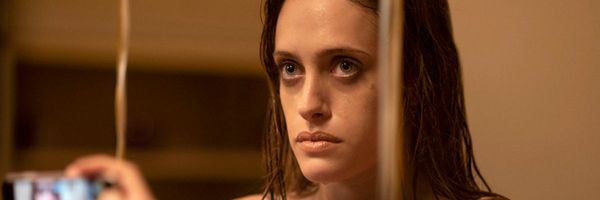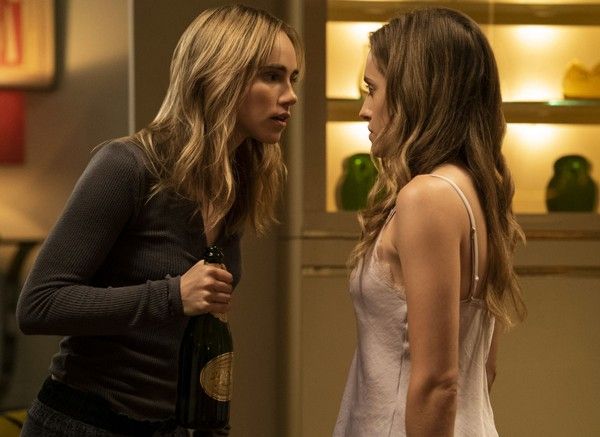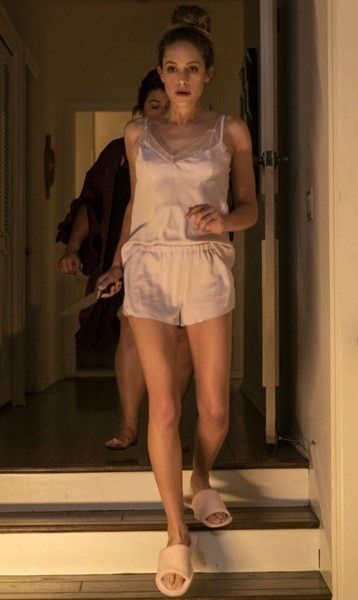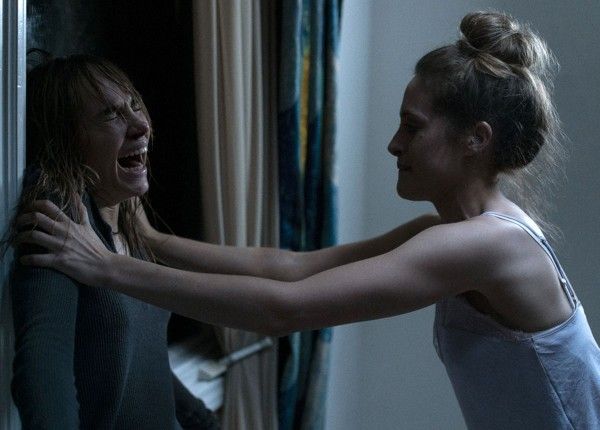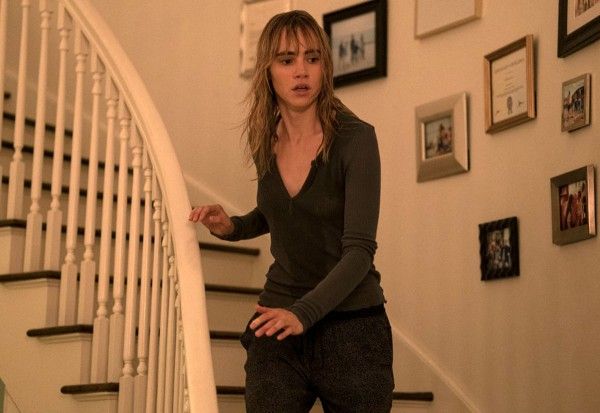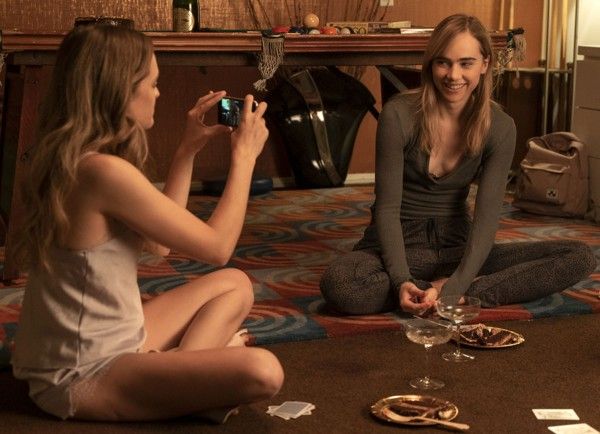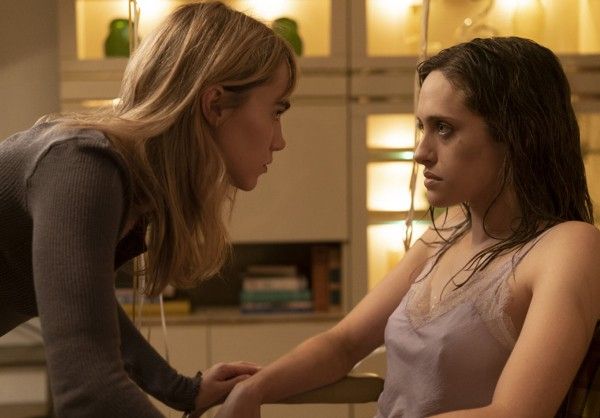As part of the 12-episode Blumhouse Television anthology series Into the Dark (available to stream at Hulu), in which there’s a new installment released each month that’s inspired by a holiday, the fourth episode, called “New Year, New You,” follows a group of friends who gather for a girls’ night reunion on New Year’s Eve. Alexis (Suki Waterhouse), Danielle (Carly Chaikin), Kayla (Kirby Howell-Baptiste) and Chloe (Melissa Bergland) are high school friends who have drifted apart, so playing a round of the party game “Never, Have I Ever,” when tensions are already high and it rehashes old memories that were better left forgotten, brings their secrets to the surface in terrifying ways.
During this 1-on-1 phone interview with Collider, director Sophia Takal talked about her experience working with Blumhouse on Into the Dark, putting her own stamp on the story, why she wanted to explore the narcissistic self-care culture that exists on social media, how the film’s ending evolved, the casting process, building the horror for the pay-offs, what she learned about herself as a filmmaker through making this, and what she’s looking to do next. Be aware that there are some spoilers discussed.
Collider: I really enjoyed this film, and thought it was just so creepy and unsettling.
SOPHIA TAKAL: Oh, cool! Thank you so much.
You’ve said that one of the reasons that you got this job is because you’re a woman. Did Blumhouse specifically tell you that that was one of the reasons they wanted you to direct this, or is that something you just felt, as you were going through the process?
TAKAL: No, they weren’t looking to hire me because I’m a woman. It was just more that they had seen Always Shine. They did comment on what I was able to bring to that movie, in terms of female friendships and female dynamics. This script that they had was exploring a different type of person and different types of issues, but it had a lot of similarities, in terms of celebrity culture, narcissism, and stuff like that. It was just that my point of view, as a woman, was something that they felt would help flesh all of that out.
How different does it feel to have that work to your advantage, instead of being excluded from a job, just because you’re a woman?
TAKAL: It feels pretty good. It’s so funny. It feels great to have that be a part of the equation for me. I like that that’s an aspect of what I bring. I feel like every director brings something else. A different woman brings something else, even, than I do, to a job. But I certainly think that it’s great that people are starting to talk more about how stories can be told from different points of view, and what a director brings to that.
Do you feel like you’ve been lucky and always had your voice listened to and heard, or have you noticed a difference, especially in the last couple of years?
TAKAL: I definitely feel like there’s a difference. I definitely feel like people are making more of a concerted effort to bring women to the table. Most of the movies that I’ve made, prior to this, were movies that I made on my own, and so, for me, a lot of the struggle coming into my own, as a director, in the first couple of movies that I made, was just feeling comfortable asserting myself and feeling that what I had to share was worthwhile. I don’t want to say it was a struggle, but it was. I did it, but it was challenging, certainly, to trust my voice and trust that I knew what I was doing. Even though I was maybe coming at things from a different angle than a guy who had gone to film school and had grown up absorbing themselves in all the tech of film cameras, and all that stuff, and I was coming at it from a different point of view, starting as an actor, and then moving to directing from that way, I definitely had to work on trusting myself and believing in myself. Sometimes, when I reflect back on that, that does feel like it was a little systemic, and that maybe I would have realized that I wanted to be a director a lot earlier, if I had been a guy. But because I was a woman and interested in movies, acting seemed like the venue for my creative activity, until I realized that I could be a director. When I think about how men dominated the industry for so long, that’s where I see the biggest effect it had on me because maybe I was slower to realize what I wanted. Even though I feel like I started focusing on it at a fairly young age, I was maybe a little slower to realize that was the job in the film industry that made the most sense for me.
I love that this is a female-directed story with an all-female cast, but I was surprised to learn that it had been written by a man. I know that you also had been encouraged to develop the characters and put your own stamp on the story, so what were the biggest changes that you made to the script, and were they mostly story or mostly character changes?
TAKAL: The script that I got, that was written by Adam [Gaines], was this really great concept of female high school friends coming back together, and there was a social media component. So, I’d say that the biggest changes were character stuff, like just making each character distinct from one another, giving them really specific points of view, and shaping the social media aspect into this health and wellness, self-care, narcissistic culture that I’m particularly interested in. But the whole idea that this happens in one house, over New Year’s, with a game of “Never, Have I Ever” and all of this back-biting, was there. I just wanted to make sure that each of the characters felt like real women.
What was it that made you feel like there was something in these narcissistic social media celebrities that was worth exploring?
TAKAL: I’m not super on social media, or aware of all of these social media and YouTube celebrities. I don’t understand that. I do think that the way social media has inserted itself into our culture, so that people are turning themselves into products, and we’re constantly performing and thinking about how everyone else is looking at us, we’re in a surveillance state because of the surveillance, but we’re also constantly assuming that we’re being photographed and we’re surveilling ourselves, in a way. I find that really disturbing. And then, I’m from New York, but I live in L. A. now, and there’s this huge industry that they call self-care that’s all about drinking juices, doing yoga, buying crystals, wearing really expensive workout clothes and getting really expensive facials, and it’s very capitalistic. It really doesn’t feel like it’s coming from a place of really learning about what’s important, to make yourself feel good about yourself. It’s about status, and I think there’s something strange about it because it feels like style over substance, when we actually should be taking care of ourselves, but that might mean not going on Instagram and not posting about all of the stuff that we’re doing for ourselves. It’s really easy to skewer social media in a non-specific way and make everyone seem like self-obsessed freaks. For me, finding a niche that is pretending that it’s doing something good and is pretending that it’s better than all of the other social media and lifestyle stuff, but is actually just doing the same amount of damage, was interesting to me to explore, partially because that’s the stuff I also buy into. When I’m thinking about wanting to be healthy, as the New Year’s coming to a close, I think about these fancy juices that I could drink instead of eating. I fall for it, so maybe that’s why I wanted to look at it more critically.
One of the things that also tends to change quite a bit on movies that have some twists and turns to them is the ending. Was this ending always the ending, or did you try any other endings, on the way to this ending?
***BEGIN SPOILER TALK***
TAKAL: This ending is different than it was in the original script. But once I figured out the dynamics of who I wanted to win in the fight, the ending made perfect sense to me. For me, it was about figuring out the specific characters and what they wanted, but then the health and wellness thing really opened things up, in terms of how the movie should end and having a satisfying goal. When Suki’s character goes, “Watch out!,” and sprays the screen, she improvised that, and I loved that so much. That’s why we put that very last moment in there. It was something that we discovered together on set.
***END SPOILER TALK***
What was the casting process like for this? Did you have any of these actresses in mind, or did you talk to a lot of people?
TAKAL: No, it was a really traditional casting process. Blumhouse has a great casting director that I worked with, and he brought a lot of great actresses to the table. I spoke to and auditioned a lot of women. Being familiar with people’s work and knowing that they’re talented actors is not always enough for me. It was really important for me to talk to these women, and understand who they are and their relationship to the things that we’re trying to explore. In this case, I wanted them to be able to talk openly about their opinions and points of view about social media, internet culture and celebrity culture, and just hear what they had to say. On set, every day, we would be doing a scene and working it out, continuing to sharpen what each character’s point of view was, and to be able to have actors bring their own points of view to the text to maybe help us discover something even more interesting than what was already there. That was really exciting. That’s a fun part of making movies, for me. If you’re flexible enough, on the day that you’re doing something, you can discover a happy accident. And so, it was important to find people that were engaged with the material, thinking about the text, analyzing the story and analyzing their character’s point of view, while being really open and up front about their own lives, in addition to being extraordinarily talented.
This really is a horror that builds throughout the story, and not a bunch of jump scares around every corner. Instead, it feels like a pay-off for something that you’re leading up to. Was that difficult to gauge and maintain, or did that feel like it came very naturally, with the story you were telling?
TAKAL: It felt pretty natural to me. To me, this is the kind of scary movie that I’m most comfortable telling. In a way, it’s similar to my last movie, in that there’s tension in every scene because of the character dynamics and people vying for status and power in their own relationships. I find that personally horrifying because that’s real. And then, in this case, it was able to come to a more traditional horror movie climax, which was also really fun and exciting for me. The pay-off on this is more traditionally horror than Always Shine, but in terms of the structure, it was something I was really familiar with. I felt comfortable working with a cinematographer who understood the movie that I was referencing and the tone I was going for, an editor who similarly understood how to build that tension, and a composer who understood how to massage the tension in the first two thirds. That made me feel like it would be okay, and hopefully pays off, in the end.
It’s interesting because Blumhouse is known for making films on a smaller budget than big studio movies have, but that actually provided you with a bigger budget than you’re used to and an expanded crew. Filmmakers talk about how they could always use extra time and extra money, so did you feel like you had that on this, or does it just never feel that way when you’re actually in it?
TAKAL: It’s interesting, I had less time than I’ve ever had, on any of my own movies, but more crew, so it balanced out. We were moving faster, but we were able to do things faster because there were more people helping. I really enjoyed having more brains to pick, more people giving ideas and more opportunities to collaborate, but I also like working with a really, really small crew, living together and doing the intimate filmmaking summer camp style thing. So, it felt different, but it didn’t feel better or worse to me.
What did you learn about yourself as a filmmaker, from making this film?
TAKAL: I learned that I could definitely handle a bigger crew than I thought I could, prior to this. I think I had always been really, really apprehensive about my ability to handle so many different people, and still feel that I was grounded and able to assert what I wanted. This is a really cool crew. It was really good work. There were lots of women, and there were still a lot of guys. One of the things that I was always nervous about was whether I would be able to assert what I wanted with 60 strange men. But I was able to do that, and I felt really proud of myself for being able to do that. I really felt like I was able to track my growth, as a director, from this experience because I felt more comfortable in the role. I didn’t need to be in a coddled environment, in order to get what I needed. Also, being able to work with executives and people giving notes, all of my other indie work is basically me and my husband, in charge of all of the decisions and feeling a little nervous about how that would go, but I found that it was an incredibly supportive dynamic. I was really happy with the way that went, too. Maybe they’re just the most special people in the world, but now I’m neither scared of a large crew anymore, nor of executives giving their opinions. I’m not worried that I’ll lose myself or my voice, in those situations.
As much as I loved New Year, New You and Always Shine, which I also loved and found totally unsettling to watch, it makes me even more excited about what you’ll do next. Do you have any idea what’s next for you? Are you thinking about what you might like to do, or are you trying to figure out what that next thing is?
TAKAL: I am. I have a few things that I’m developing with people, but nothing so concrete yet that I feel like I can talk about it. But, I’m hoping to make another movie really soon. And I like working in genre, but I also love the idea of making a movie that’s totally outside of this tone, like maybe a romantic comedy. So, I’m just figuring out the story that either I want to tell, or I’ll find someone else’s script that makes the most sense to be the next thing that I do. My favorite part is definitely working with actors, so when I’m thinking about movies to make, I just want to be able to create interesting characters and give actors an opportunity to play interesting roles. That’s where my head is at. I always start with a character that I wanna explore.
With so many great projects on TV now and so much great talent to work with in that medium, have you considered doing any TV projects? Is that something that you’re also looking at?
TAKAL: Yes, totally! Definitely! I think TV is so cool. I would really like to direct TV.
Into the Dark - “New Year, New You” is now available to stream on Hulu.

